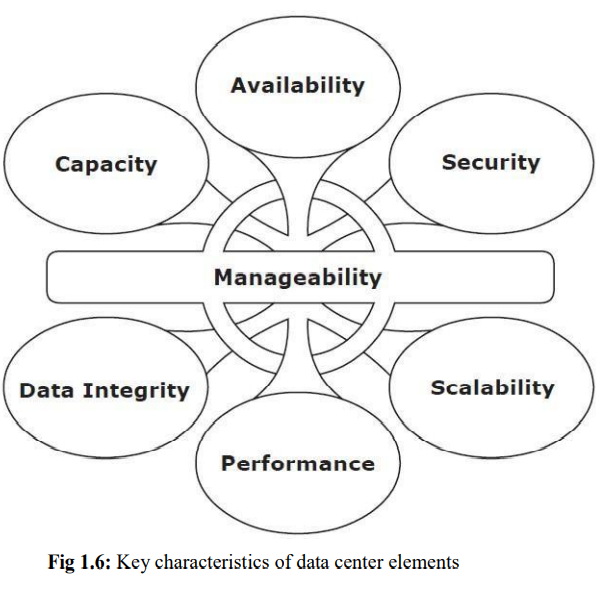Discuss the key characteristics of data centre with neat diagram?
STORAGE AREA NETWORKExplanation
1609
0
Key characteristics of data center elements are:
1) Availability: All data center elements should be designed to ensure accessibility. The
inability of users to access data can have a significant negative impact on a business.
2) Security: Polices, procedures, and proper integration of the data center core elements that will prevent unauthorized access to information must be established. Specific mechanisms must enable servers to access only their allocated resources on storage arrays.
3) Scalability: Data center operations should be able to allocate additional processing capabilities (eg: servers, new applications, and additional databases) or storage on demand, without interrupting business operations. The storage solution should be able to grow with the business.
4) Performance: All the core elements of the data center should be able to provide optimal performance and service all processing requests at high speed. The infrastructure should be able to support performance requirements.
5) Data integrity: Data integrity refers to mechanisms such as error correction codes or parity bits which ensure that data is written to disk exactly as it was received. Any variation in data during its retrieval implies corruption, which may affect the operations of the organization.
6) Capacity: Data center operations require adequate resources to store and process large amounts of data efficiently. When capacity requirements increase, the data center must be able to provide additional capacity without interrupting availability, or, at the very least, with minimal disruption. Capacity may be managed by reallocation of existing resources, rather than by adding new resources.
7) Manageability: A data center should perform all operations and activities in the most efficient manner. Manageability can be achieved through automation and the reduction of human (manual) intervention in common tasks.
2) Security: Polices, procedures, and proper integration of the data center core elements that will prevent unauthorized access to information must be established. Specific mechanisms must enable servers to access only their allocated resources on storage arrays.
3) Scalability: Data center operations should be able to allocate additional processing capabilities (eg: servers, new applications, and additional databases) or storage on demand, without interrupting business operations. The storage solution should be able to grow with the business.
4) Performance: All the core elements of the data center should be able to provide optimal performance and service all processing requests at high speed. The infrastructure should be able to support performance requirements.
5) Data integrity: Data integrity refers to mechanisms such as error correction codes or parity bits which ensure that data is written to disk exactly as it was received. Any variation in data during its retrieval implies corruption, which may affect the operations of the organization.
6) Capacity: Data center operations require adequate resources to store and process large amounts of data efficiently. When capacity requirements increase, the data center must be able to provide additional capacity without interrupting availability, or, at the very least, with minimal disruption. Capacity may be managed by reallocation of existing resources, rather than by adding new resources.
7) Manageability: A data center should perform all operations and activities in the most efficient manner. Manageability can be achieved through automation and the reduction of human (manual) intervention in common tasks.
